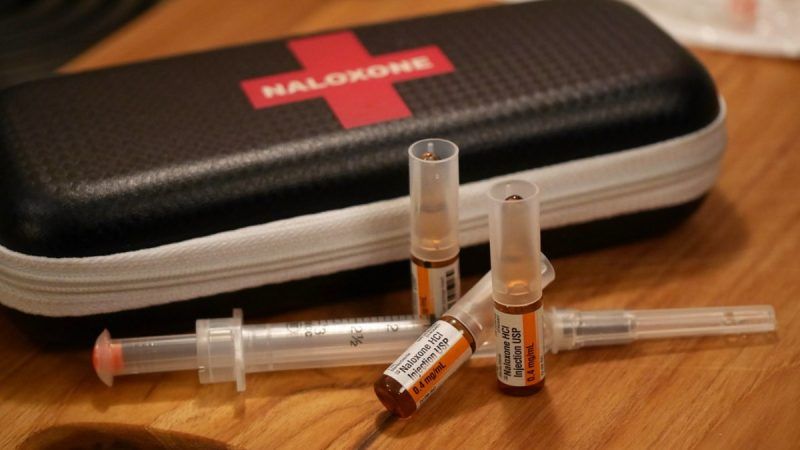Another Way Fentanyl Phobia Can Be Deadly: It Undermines Good Samaritan Laws
Irrational fear of incidental contact with opioids can lead to criminal charges that make overdose bystanders less likely to call 911.

One way that irrational fear of secondary contact with fentanyl can endanger people's lives is by encouraging first responders to take unnecessary precautions that may delay administration of naloxone, an opioid antagonist that reverses overdoses. Another way, as Bridgeton, New Jersey, Mayor Albert Kelly notes in a recent NJ.com opinion piece, is by undermining Good Samaritan laws that are supposed to reassure bystanders that they won't face criminal charges as a result of calling 911 to report an overdose. But even as Kelly decries the threat posed by charges such as reckless endangerment against people at the scene of an overdose, he reinforces the fentanyl phobia underlying that sort of legal response.
Kelly cites the case of Scotty Hatton, a Kentucky man who was hit with 10 charges of wanton endangerment after he called 911 when his stepfather overdosed in 2017. His girlfriend and stepfather faced the same charges. While Kentucky's Good Samaritan law shields people from drug possession charges in situations like that, it does not cover the charges against Hatton. New Jersey's Good Samaritan law is similar in that respect, and Kelly rightly worries about "work-arounds" that would "defeat the spirit of this law."
So far, so good. But Kelly is far too credulous about the threat allegedly posed by accidental contact with fentanyl. Here is how he describes the incident that inspired the case against Hatton (emphasis added):
Apparently, one of the responding EMTs became ill and passed out while transporting the overdose victim to the hospital. The EMT was revived en route by his partner; a second ambulance transported the sickened EMT to the hospital.
As for what made the EMT sick, speculation was that the overdose victim had trace amounts of the powerful synthetic opioid fentanyl on his body. Theoretically, this fentanyl—which is at least 50 times more powerful than morphine—got onto the EMT and was absorbed through his skin.
This scenario is possible because of fentanyl's potency. Its cousin, carfentanil, which is used to sedate elephants, is about 1,000 times more potent than morphine. Today's street heroin is routinely laced with one of the two synthetic opioids. Whether or not one of these drugs caused the Kentucky EMT's symptoms, there have been other reported cases of first responders being overcome while treating overdose victims.
It seems quite clear that the symptoms experienced by the Kentucky EMT, Scottie Wightman, were not caused by fentanyl or a fentanyl analog. The New York Times reports that Wightman "radioed for help after he used a towel to dry off" Hatton's stepfather. Wightman "lost consciousness and was treated with naloxone, but his drug test was negative" (emphasis added).
In an interview with the Times, Wightman described the incident as a near-death experience. "What was going through my mind was, 'Here I am trying to help someone and keep them alive, and I almost died doing that,'" he said. "I'm supposed to be helping someone, yet in my mind, it's like they just tried to kill me."
Yes, in his mind, but not in reality, as the drug test showed. "Fentanyl and its analogs are potent opioid receptor agonists, but the risk of clinically significant exposure to emergency responders is extremely low," the American College of Medical Toxicology and the American Academy of Clinical Toxicology noted in a 2017 position paper. "To date, we have not seen reports of emergency responders developing signs or symptoms consistent with opioid toxicity from incidental contact with opioids. Incidental dermal absorption is unlikely to cause opioid toxicity."
Ryan Marino, a Pittsburgh emergency physician and toxicologist, put it this way on Twitter last year: "No matter the potency of any opioid (even carfentanil!) you can't overdose from being nearby, touching it or breathing air near it. Period. Always." Advocates of harm reduction like Kelly should be making that point instead of crediting the subjective reports of first responders like Wightman, whose media-fed fear becomes self-fulfilling.
Hatton told the Times that if he could go back in time, he would still call 911, notwithstanding his legal troubles. "I didn't want him to die," he said. But given official responses like this, other overdose bystanders may well be less inclined to follow Hatton's example, with potentially deadly results.


Show Comments (5)